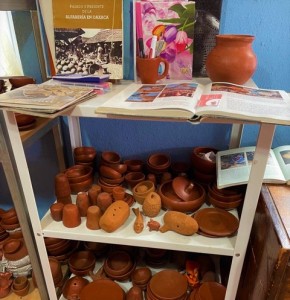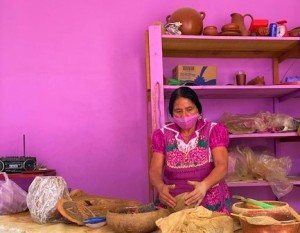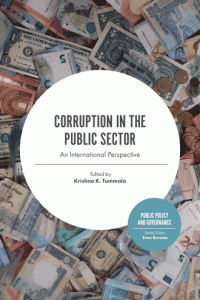~Sabith Khan, Ph.D.
Here is a discovery I made, based on one interview in Oaxaca, Mexico. I know that for a scientifically reliable insight, a sample size of one is not considered reliable. However, indulge me as I share one remarkable insight into how artisans and crafts persons are surviving the pandemic in Oaxaca, Mexico. The secret: through barter.
On a recent visit to one of the pueblos in the vicinity of Oaxaca de Juarez in Oaxaca, I encountered an artisan – a lady who works with red clay – and is someone part of a women’s cooperative formed about 20 years ago.
The potters who form the cooperative are all women who work with clay to form various types of products – plates for food, ornamental objects for decoration, and kitchen utensils, too. This has been a way of life for them for centuries, and though sometimes times are tough, these women have stuck it out. I was interested in learning more about how they are surviving the pandemic. One of the women said, “Well, we are not asking for money anymore. We are ok with barter. If a farmer pays us with onions or tomatoes instead of cash, we are ok with it.” 
“So, barter is what you are doing,” a colleague of mine inquired.
“Yes, we don’t call it that; but yes, an exchange of somewhat equal value.”
The leader of the group, Doña Macarena, was not too happy with this setup. Though she didn’t speak to the is sue of barter directly, she pointed out that people sometimes don’t recognize the value and craft involved in making clay pots. “We are artisans making beautiful products, and sometimes we find people who don’t recognize our talents and work,” she said.
However, as I prepared to leave the workshop, after a lively demonstration during which Doña Macarena made a Comal for us, in no more than 10 minutes, an exquisite plate-like object, she added that this was the very first clay object that she learnt to make from her own mother. “I am happy to be keeping up the tradition and knowledge; that is how we survive,” she added. That, and a little bit of innovation and a little bit of pragmatism seem to be the trick to surviving the pandemic for these artisans.


